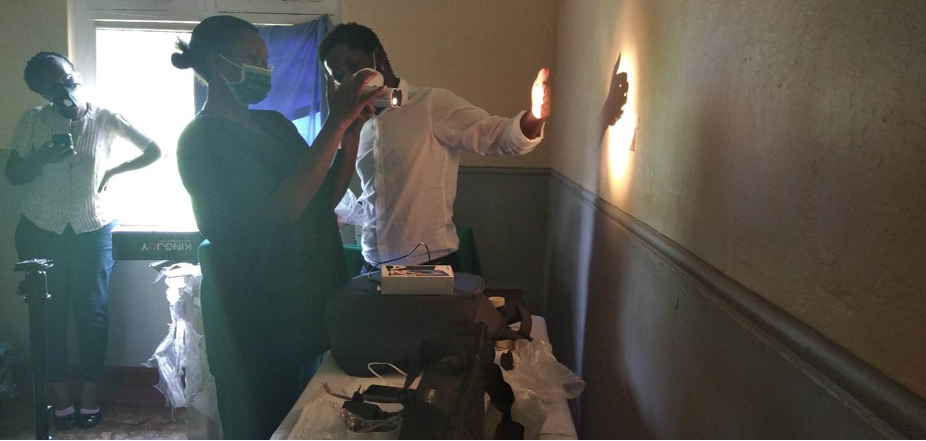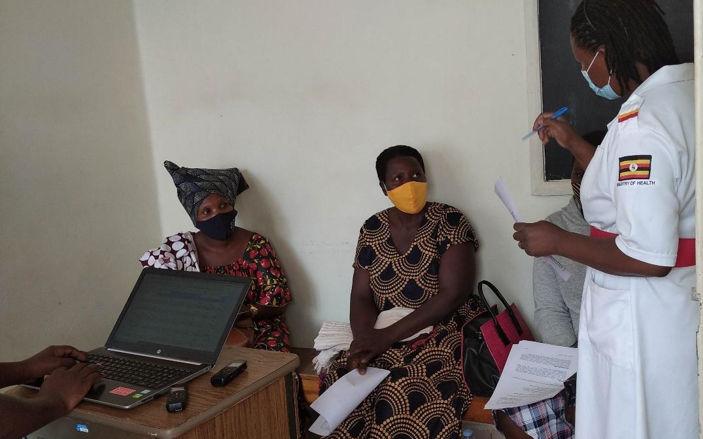Cervical cancer screening in Uganda
Spider has supported the use of telehealth for cervical cancer screening and care in Uganda since 2018. The project has scaled from two to five sites, giving access to better screening for cervical cancer in rural areas and quicker expert feedback to satellite clinics.
Total screenings
Screenings per year
- 2019 22%
- 2020 21%
- 2021 57%

Setup of screening devices in Jinja

Patient focus group discussions in Mbarara
Spider has supported the use of telehealth for cervical cancer screening and care in Uganda since 2018. The project has enabled Uganda Cancer Institute (UCI) to acquire mobile colposcopies for survival cancer screening and to train nurses and doctors on how to use colposcopies to screen for cancer. The project started with two screening sites, one in the capital Kampala and another at a satellite clinic in Mayuge, one of the districts.
The project has scaled from two to five sites. The additional three sites are in the districts of Mbarara (western Uganda), Jinja (eastern Uganda) and Arua (Northern Uganda). Research has been used to evaluate the initiatives and activities of the project. It also studied the challenges of using telehealth and mobile colposcopies, and the experiences and perceptions of health workers and patients towards the use the technology. The first result follow-up study was carried out in 2019.
The latest result follow-up shows that 2538 women had been screened. 560 screened in 2019, 540 in 2020, and 1438 screened in 2021. In the 2021 project extension, screening results from each site were as follows: 488 (33.9%) from Arua 200 (13.9%) from Jinja, 225 (15.6%) from Mbarara, 325 (22.6%) from Mayuge and 200 (13.9%) from Uganda Cancer Institute.
%
Arua
%
Jinja
%
Mbarara
%
Mayuge
%
Kampala
This table compares baseline and end-line data:
| Result | Indicator (before and after 2021) | |
| Baseline | End-line | |
| Number of patients screened | 1100 | 2538 |
| Number of health professionals trained to the colposcopy | 15 | 30 |
| Level of satisfaction by the patients on the use of the mobile colposcopy screening services | 100% | 100% |
| Use of screening services in satellite clinics | 100% (Female) | 100% (Female) |
| Time taken by health workers get feedback after consulting the remote expert | 1-3 days | 1 day |
| Percentage of patients that receive reminders for follow-up screening visits | 10% | 10% |
| Percentage of the number of times a nurse consults a remote expert for a second opinion during case screening | 20% of the cases | 20% of the cases |
| Level of health worker satisfaction in the telehealth program | 80% | 100% |
Research assisted the implementing team to:
- inform the development a mobile based application for cervical cancer screening at the point-of-care.
- integrate gynecologists’ views into the development of the application where the gynecologists can be consulted in-app on complicated cases.
- advised on how to improve the overall quality of the images taken by the health workers and the overall workflow improvements at other study sites.
- advance improvements of the artificial intelligence model used by the colposcopy software.
The challenges identified in the first study are still prevalent. Recommendations also remain the same: increase awareness for women to go for cervical cancer screening, train health personnel to minimize errors when screening, use good internet connections to avoid network interruptions and extend the screening services to marginalized groups of people.
